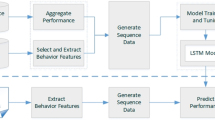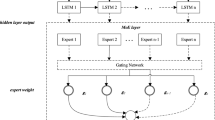Abstract
Interactive learning is a two-way learning method of learners independently by using computer and network technology. In the interactive relationships, interactive learning plays a role for learners to achieve the learning purpose, interactive learning has become an important effect of online learning, but it also has many problems that need to be improved. In particular, how to apply the massive data to achieve data-driven early warning needs further research. This study firstly mines the temporal series of learning behavior features, the corresponding data is collected from one online learning platform of The UK Open University, the massive data obtained from the platform have been desensitized, disclosed and shared, which might ensure the comparison and verification of research results. Secondly, we design a early warning mechanism based on temporal memory enhancement model. Through a large number of data training and testing, this method is useful to the analysis of learning behavior features, and has strong effectiveness and reliability. Thirdly, the decision and intervention mechanism are mined and predicted. The whole work is of great significance to the early warning mechanism of interactive learning process, which has strong theoretical value and practical significance.











Similar content being viewed by others
Data availability
The datasets used during the current study are available from the corresponding author on reasonable request.
References
Brandmiller, C., Dumont, H., & Becker, M. (2020). Teacher perceptions of learning motivation and classroom behavior: the role of student characteristics. Contemporary Educational Psychology, 63(2020), 101893, 1–11 https://doi.org/10.1016/j.cedpsych.2020.101893
Clark, J. A., Liu, Y., & Isaias, P. (2020). Critical success factors for implementing learning analytics in higher education: a mixed-method inquiry. Australasian Journal of Educational Technology, 36(6), 89–106 https://doi.org/10.14742/ajet.6164
de Brabander, C. J., & Glastra, F. J. (2021). The unified model of task-specific motivation and teachers’ motivation to learn about teaching and learning supportive modes of ict use. Education and Information Technologies., 26(1), 393–420. https://doi.org/10.1007/s10639-020-10256-7
Dietrich, Greiner, F., Weber-Liel, D., Berweger, B., N Kmpfe, Kracke, B. (2021). Does an individualized learning design improve university student online learning? a randomized field experiment. Computers in Human Behavior, 122(5), 106819, 1–12 https://doi.org/10.31234/osf.io/hkq7m
Fischer, C., Pardos, Z. A., Baker, R. S., Williams, J. J., & Warschauer, M. (2020). Mining big data in education: Affordances and challenges. Review of Research in Education, 44(1), 130–160. https://doi.org/10.3102/0091732X20903304
Ghani, A., Rahim, A., Yusoff, M., Hadie, S. (2021). Effective learning behavior in problem-based learning: a scoping review. Medical Science Educator, 1–13https://doi.org/10.1007/s40670-021-01292-0
Hellings, J., Haelermans, C. (2020). The effect of providing learning analytics on student behaviour and performance in programming: a randomised controlled experiment. Higher Education, 1–18https://doi.org/10.1007/s10734-020-00560-z
Ju, S. L., Sylvén, L. K. (2021). The role of informal digital learning of english in korean and swedish efl learners' communication behaviour. British Journal of Educational Technology, 00(3), 10.1810.1111/bjet.13082
Ko, M. H. (2021). Uncovering university students’ device usage patterns in a korean online learning context using learning analytics. Computer Assisted Language Learning, 3, 1–30. https://doi.org/10.1080/09588221.2021.1888751
Mangaroska, K., Vesin, B., Kostakos, V., Brusilovsky, P., Giannakos, M. (2021). Architecting analytics across multiple e-learning systems to enhance learning design. IEEE Transactions on Learning Technologies, PP(99), 1–16 https://doi.org/10.1109/TLT.2021.3072159
Mangaroska, K., Martinez Aldonado, R., Vesin, B., & Gaevi, D. (2021). Challenges and opportunities of multimodal data in human learning: the computer science students’ perspective. Journal of Computer Assisted Learning, 3, 1–32. https://doi.org/10.1111/jcal.12542
Nie, J., Zheng, C., Zeng, P., Zhou, B., Wang, P. (2020). Using the theory of planned behavior and the role of social image to understand mobile english learning check-in behavior. Computers & Education, 156(2020), 103942, 1–13 https://doi.org/10.1016/j.compedu.2020.103942
Pazmio-Maji, R., Conde, M., García-Pealvo, F. (2021). Learning analytics in ecuador: a systematic review supported by statistical implicative analysis. Universal Access in the Information Society, 1–18https://doi.org/10.1007/s10209-020-00773-0
R Authmann, J. F. (2020). A (more) behavioural science of personality in the age of multi-modal sensing, big data, machine learning, and artificial intelligence. European Journal of Personality, 34(5), 1–19https://doi.org/10.1002/per.2310
Sailer, M., Schultz-Pernice, F., Fischer, F. (2021). Contextual facilitators for learning activities involving technology in higher education: the c-model. Computers in Human Behavior, 121(4), 106794, 1–13 https://doi.org/10.1016/j.chb.2021.106794
Xia, X. (2020a). Learning behavior mining and decision recommendation based on association rules in interactive learning environment. Interactive Learning Environments, Advance online publication 4 Aug 2020a. 1–16 https://doi.org/10.1080/10494820.2020.1799028
Xia, X. (2020b). Random field design and collaborative inference strategies for learning interaction activities. Interactive Learning Environments, Advance online publication 30 Dec 2020b. 1–25 https://doi.org/10.1080/10494820.2020.1863236
Xia, X. (2021a). Sparse Learning Strategy and Key Feature Selection in Interactive Learning Environment. Interactive Learning Environments., 2021(11), 1–25. https://doi.org/10.1080/10494820.2021.1998913
Xia, X. (2021b). Interaction recognition and intervention based on context feature fusion of learning behaviors in interactive learning environments. Interactive Learning Environments, Advance online publication 17 Jan 2021b. 1–19 https://doi.org/10.1080/10494820.2021.1871632
Xia, X. (2021c). Decision application mechanism of regression analysis of multi-category learning behaviors in interactive learning environment. Interactive Learning Environments, 2021(4), 1–14. https://doi.org/10.1080/10494820.2021.1916767
Xia, X. (2022a). Diversion inference model of learning effectiveness supported by differential evolution strategy. Computers and Education: Artificial Intelligence., 3(1), 100071. https://doi.org/10.1016/j.caeai.2022.100071
Xia, X. (2022b). Application Technology on Collaborative Training of Interactive Learning Activities and Tendency Preference Diversion. SAGE Open, 12(2), 1–15. https://doi.org/10.1177/21582440221093368
Xia, X., & Qi, W. (2022). Temporal tracking and early warning of multi semantic features of learning behavior. Computers and Education: Artificial Intelligence., 3(1), 100045. https://doi.org/10.1016/j.caeai.2021.100045
Zheng, L., Zhong, L., & Niu, J. (2021). Effects of personalised feedback approach on knowledge building, emotions, co-regulated behavioural patterns and cognitive load in online collaborative learning. Assessment & Evaluation in Higher Education, 2, 1–17. https://doi.org/10.1080/02602938.2021.1883549
Zhu, J., Bruhn, A., Yuan, C., & Wang, L. (2021). Comparing the effects of videoconference and email feedback on treatment integrity. Journal of Applied Behavior Analysis., 54(2), 618–635. https://doi.org/10.1002/jaba.810
Acknowledgements
Thanks for the technical support provided by the laboratory of School of Software of Tsinghua University, as well as the theoretical guidance and practical reference provided by Qufu Normal University.
Funding
This study is supported by National Office for Philosophy and Social Sciences (Grant NO. BEA190107).
Author information
Authors and Affiliations
Corresponding author
Ethics declarations
Credit author statement
Xiaona Xia: Methodology, Software, Validation, Formal analysis, Investigation, Resources, Data analytics, Writing-original draft, Writing-review & editing, Visualization, Project administration.
Wanxue Qi: Conceptualization, Writing-review & editing.
We declare that we have no financial and personal relationships with other people or organizations that can inappropriately influence our work, there is no professional or other personal interest of any nature or kind in any product, service and/or company that could be construed as influencing the position presented in, or the review of, the manuscript entitled.
The whole research does not involve human participants and/or animals.
Conflict of interest
No conflict of interest exits in the submission of this manuscript, and manuscript is approved by all authors for publication. I would like to declare on behalf of my co-authors that the work described was original research that has not been published previously, and not under consideration for publication elsewhere, in whole or in part. All the authors listed have approved the manuscript that is enclosed.
Additional information
Publisher's note
Springer Nature remains neutral with regard to jurisdictional claims in published maps and institutional affiliations.
Rights and permissions
About this article
Cite this article
Xia, X., Qi, W. Early warning mechanism of interactive learning process based on temporal memory enhancement model. Educ Inf Technol 28, 1019–1040 (2023). https://doi.org/10.1007/s10639-022-11206-1
Received:
Accepted:
Published:
Issue Date:
DOI: https://doi.org/10.1007/s10639-022-11206-1




